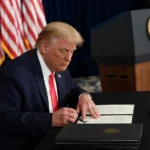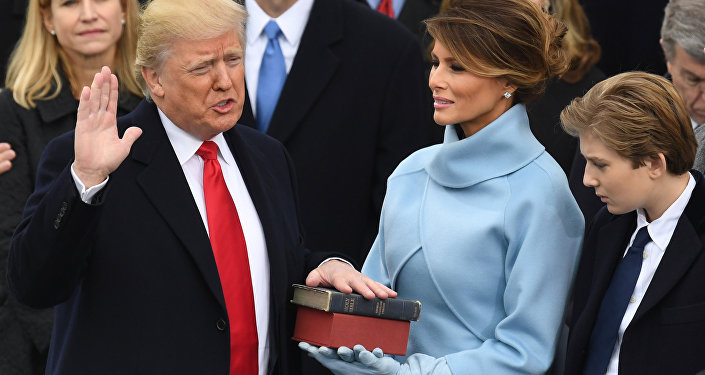This past November, our country went to the polls and elected Donald Trump as the 45th President of the United States. However, some believe that there were other forces at play. This June, news broke that hackers associated with the GRU, a sect of the Russian military, had broken into the Democratic National Committee (DNC) computer network, releasing thousands of emails through WikiLeaks that exposed DNC bias against Senator Bernie Sanders, forcing the DNC chairwoman, Debbie Wasserman Schultz, to resign. The next month, the FBI started a secret probe into Russian interference as well as the involvement of members of Trump’s campaign.
To say the least, Trump’s associates have some very unique connections to Russia. On June 20, 2016, Trump appointed Paul Manafort as his campaign manager. Before his time as campaign manager, Manafort had worked for pro-Russian political groups as well as deposed Ukrainian president and Russian ally Victor Yanukovych. Last August, Trump’s friend and advisor Roger Stone confessed that he had communicated with WikiLeaks, the same organization that had released the emails of the DNC. One month later, Senator Jeff Sessions, the current attorney general for President Trump, secretly met in Washington with Russian ambassador Sergey Kislyak. This past December Jared Kushner also met with Kislyak and allegedly discussed plans for setting up a secret communications channel. A few months later, Trump appointed Lt. General Michael Flynn as his national security advisor. Later, it was discovered that Flynn had not disclosed to the government $45,000 he was paid to speak at an event for the Russian government-affiliated news network RT. On March 2nd, Attorney General Jeff Sessions announced that he would recuse himself from the Russian investigation for failing to disclose his contact with Kislyak. In addition, there is also some speculation that Trump may have collaborated with Russian contacts of the campaign. When asked about this matter, freshman Nicole Rosenzweig said, “I think any collaboration he did was within the capabilities of the law and there is no proof.”
This past May Trump publicly fired FBI director James Comey, although he wavered on his reason. At first, Trump claimed that he had fired Comey for his announcement that the FBI was investigating more of Hillary’s emails just weeks before the election. However, he later insinuated that he fired Comey due to his handling of the Russian investigation. Soon after, it was disclosed that Comey had written memos after each of various private meetings Trump had organized with him. According to Comey, at one January meeting, Trump asked him to “pledge loyalty” to him, which Comey refused to do. In February, Trump allegedly asked Comey to end the investigation into former national security advisor Michael Flynn, saying “I hope you can let this go”, according to Comey. Freshman Aidan O’Neil said, “Trump must have had a good reason to fire Comey.” However, sophomore Carly Kabot sees it from a different angle. She believes that “asking [Comey] to back off an investigation is completely against the fundamentals of our country.” As she put it, “there is a reason we have checks and balances and this whole issue goes to show that he doesn’t honor our system.”
No matter whether you consider Trump’s actions or the connections of his associates to Russia suspicious, they have definitely caused a large amount of controversy now that Trump is in office, with some even calling for Trump’s impeachment. In January, both the House and Senate intelligence committees announced that they would open investigations into Russian interference, as well as possible collaboration between Russia and Trump’s campaign. Some of these investigations have been criticized as being too political. In the view of sophomore Amanda Cappelli, “I don’t agree with some…[of Trump’s]…policies but that doesn’t mean we should go around hating our own president.” In an interesting turn of events, Representative Devin Nunes of California oversaw the Russia investigation until this April, when he announced that he would recuse himself from the investigation because of a meeting he had with members of President Trump’s team at the White House. On June 9, Comey testified before the Senate Intelligence Committee. Under oath, he quoted president Trump as saying to him “I need loyalty, I expect loyalty.” In addition, Comey stated, “I was fired because of the Russia investigation…I was fired in some way to change the way the Russia investigation was being conducted.” Hours later, Trump accused Comey of lying under oath and volunteered to provide sworn testimony disputing the idea that he forced out Comey for his handling of the Russia investigation. Meanwhile, some congressmen are already drawing up articles of impeachment for Trump. According to the Washington Examiner, Texas congressman Al Green (D), as well as California congressman Brad Sherman (D) are already writing impeachment articles for Donald Trump on the grounds that his discussions with and firing of James Comey amount to obstruction of justice, which can be an impeachable offense.
There is very little precedent in terms of impeachment proceedings for a sitting president. In the history of the United States, impeachment charges have only been brought against three presidents: Andrew Johnson, Bill Clinton, and Richard Nixon. However, Johnson and Clinton were both acquitted by the Senate, and Nixon resigned before impeachment proceedings could begin. In order for a president to be impeached a list of impeachment charges must be brought before the House of Representatives, which in this case would include obstruction of justice. However, the Constitution is not very specific on what qualifies impeachment, as it only describes “treason, bribery, and high crimes and misdemeanors” as the grounds for doing so. When Rosenzweig was asked whether collaboration with Russia justifies impeachment, she stated that “It depends on the level of collaboration and whether that was consistent with the laws.” According to constitutional scholar Akhil Amar, impeachment is also not just legal, but political, as politicians are judging the president. The reason that some claim Trump should be impeached, obstruction of justice, is also a relatively murky charge that refers to “whoever corruptly, or by threats or force, or by any threatening.. communication, endeavors to influence, intimidate, or impede any…officer…of the United States,” according to the United States Federal Law Code. However, most experts agree that it is criminal intent that determines obstruction of justice. If Trump is impeached on these charges, the Senate then must decide whether to convict or acquit him. If convicted, Trump would have to leave office and could theoretically also face criminal charges. However, this is unlikely as it has not yet been proven that Trump obstructed justice, and Congress is controlled by President Trump’s own Republican Party, which would be reluctant to convict “one of their own” in the White House.
It is clear that the various investigations surrounding Trump and Russian interference in the presidential election are far from over. As more details emerge by the day, it is impossible to know where this saga may turn. However, no matter one’s political beliefs, the entire country must work together to make sure that if any illegal actions occurred, the perpetrators will be brought to justice.







